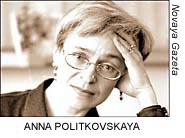Attacks on the Press 2004: Russia
RussiaA midyear purge of independent voices on state television and an alarming suppression of news coverage during the Beslan hostage crisis marked a year in which Russian President Vladimir Putin increasingly exerted Soviet-style control over the media. Using intelligence agents and an array of politicized state agencies, Putin pushed for an obedient and patriotic press…
Independent coverage obstructed in Beslan; detentions, harassment reported
New York, September 7, 2004— Independent media coverage of last week’s hostage crisis in Beslan, Russia, was obstructed several times by detentions or harassment, the Committee to Protect Journalists has found. Thirty to 40 heavily armed fighters, allegedly of Chechen, Ingush and North Ossetian origin, took more than 1,000 children, parents and teachers hostage on…
PROMINENT RUSSIAN JOURNALIST SENTENCED TO PRISON FOR HOOLIGANISM
New York, September 3, 2004-—The Committee to Protect Journalists is outraged at today’s decision of a Moscow court to sentence prominent journalist Andrei Babitsky, a correspondent for the Russian Service of the U.S. governmentfunded Radio Free Europe/Radio Liberty (RFE/RL), to five days in prison for “hooliganism.” According to local press reports, police at Vnukovo Airport…

Another journalist detained at Moscow airport
New York, September 2, 2004—The Committee to Protect Journalists is alarmed by reports that prominent Russian journalist Anna Politkovskaya was poisoned last night en route to Beslan, North Ossetia, where about 40 heavily armed fighters, reportedly of Chechen and Ingush origin, seized hostages at an elementary school yesterday.
Attacks on the Press 2003: Europe and Central Asia Analysis
While integration into NATO and the European Union has had a positive effect on press freedom conditions in most of Central Europe and the Baltic states, the situation for journalists in Russia and the former Soviet republics has worsened steadily, with governments relying on authoritarian tactics to silence the media. Even reformist governments in the…
Attacks on the Press 2003: Russia
Russian president Vladimir Putin and his coterie of former intelligence officials pressed ahead in 2003 with his vision of a “dictatorship of the law” in Russia to create a “managed democracy.” Putin’s goal of an obedient and patriotic press meant that the Kremlin continued using various branches of the politicized state bureaucracy to rein in…
CPJ RECEIVES OSCE PRIZE FOR JOURNALISM AND DEMOCRACY
Acceptance Speech by Ann Cooper ON BEHALF OF THE AMERICAN JOURNALISTS WHO FOUNDED THE COMMITTEE TO PROTECT JOURNALISTS NEARLY A QUARTER OF A CENTURY AGO, I THANK YOU FOR THIS GREAT HONOR. THIS PRIZE COMES AT A CRUCIAL MOMENT FOR GLOBAL PRESS FREEDOM–A TIME WHEN MANY GOVERNMENTS, INCLUDING THE UNITED STATES, INCREASINGLY CITE THE WAR…
National media outlets agree to curb reporting on terrorism
New York, April 11, 2003—The Committee to Protect Journalists (CPJ) is concerned about the “Anti-Terrorist Convention,” which was signed on Tuesday, April 8, by directors of several leading national broadcast media outlets, who agreed to accept voluntary restrictions on their coverage of terrorism and anti-terrorist government operations. The media executives who signed the agreement (click…